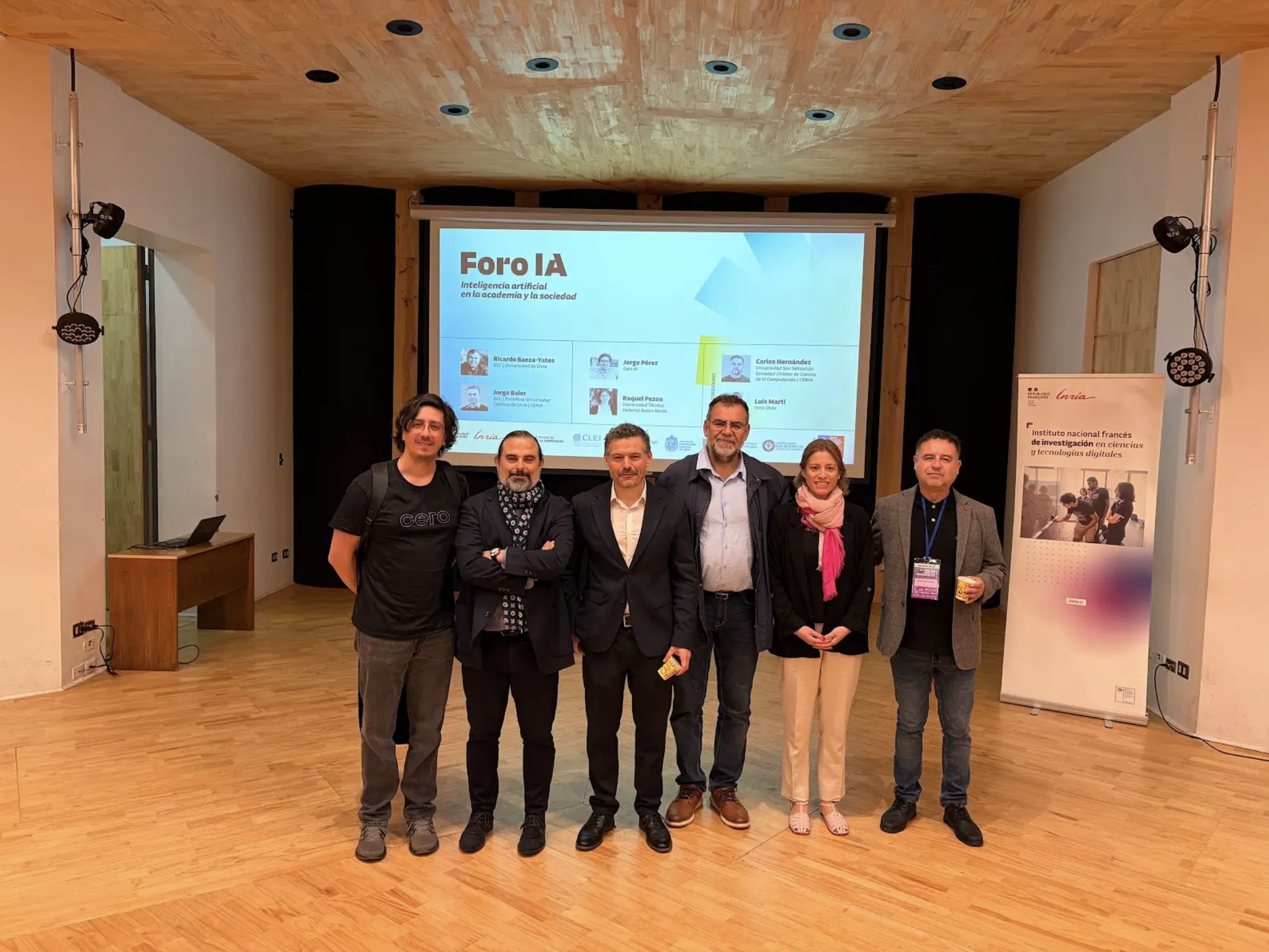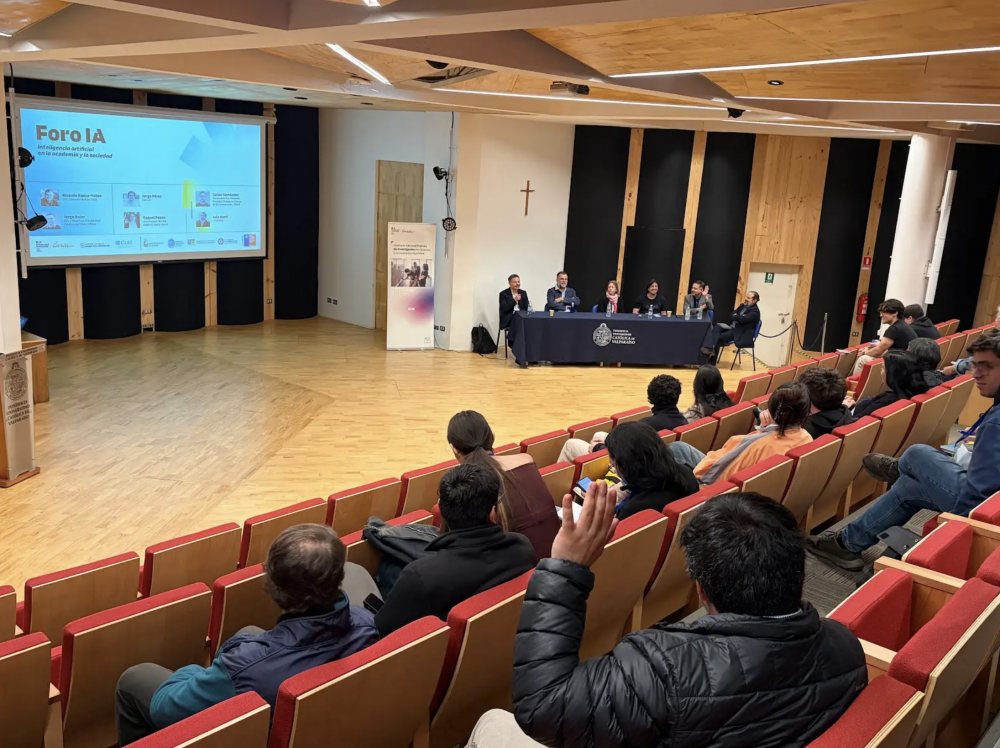
On 29 October, Inria Chile and the Chilean Computer Science Society (SCCC) organised the “AI Forum: Artificial Intelligence in Academia and Society” The meeting took place at the School of Computer Engineering, Pontificia Universidad Católica de Valparaíso, as a satellite event of the Chilean Computing Days 2025 (JCC 2025) and the 51st Latin American Computing Conference (CLEI).
The session was moderated by Luis Martí, Scientific Director of Inria Chile, and Carlos Hernández, academic at Universidad San Sebastián, member of the Chilean Computer Science Society (SCCC) and researcher at the National Center for Artificial Intelligence (CENIA).
Guest speakers Jorge Baier, Associate Professor in the Department of Computer Science at the Pontificia Universidad Católica de Chile and researcher at CENIA; Ricardo Baeza-Yates, academic in the Department of Computer Science at the Universidad de Chile; Jorge Pérez, co-founder of Cero AI; and Raquel Pezoa, academic at the Universidad Técnica Federico Santa María, shared reflections on a range of themes.
These opening presentations were essential to frame the discussion with the audience.
The challenges of a fast-evolving AI
Raquel Pezoa presented “Safety AI,” the international report led by Yoshua Bengio and published in January 2025 ahead of the AI Action Summit, Paris 2025. She highlighted the rapid pace at which artificial intelligence is advancing, showing its swift evolution from text generation to solving complex problems in mathematics and software engineering. Pezoa warned that these powerful capabilities bring emerging risks: the malicious use of AI by individuals or entities, AI malfunction, and systemic AI risks such as impacts on the labour market or the environment. According to Pezoa, the report seeks “to provide objective information, crucial for society and, above all, for decision-makers and regulators, so that public policies and laws take into account the risks of artificial intelligence.”
For his part, Ricardo Baeza-Yates outlined different risks associated with artificial intelligence: bias risks that can lead to automated discrimination; risks linked to the anthropomorphisation of AI; risks around transparency, explainability and accountability; and political and social risks tied to generative AI, including the capacity to create and mass-disseminate false news and high-impact political or social manipulation. He also highlighted health-related risks — in particular mental health — as well as risks linked to AI’s impact on work and rising inequalities. According to Baeza-Yates: “the future of our society depends on the good use of AI.”
As for Jorge Baier, he explained the changes and profound impact that generative AI is having on the way we learn — particularly in higher education among engineering and computer science students. The transmission of knowledge and the role of lecturers are being deeply affected by this shift and, in this transition, Baier argues that academics should both reflect critically on their role and seize the opportunities offered by artificial intelligence. “We need to make changes on two fronts: first, use AI to personalise our teaching, providing high-quality feedback paced to each student; second, we should seize the opportunity AI offers to optimise our curricula and create more room to develop more human skills in our students, such as sensitivity to the needs of others,” Baier explained.
Training in artificial intelligence is indispensable for successful adoption in industry — one of the major challenges for 21st-century economies and societies. Jorge Pérez, co-founder of the Cero.AI start-up — a company that provides practical AI solutions for healthcare operators and patients — left academia to focus on the start-up world. Pérez illustrated how, at his company, teams are trained in-house on how each AI tool they use actually works. He also noted that
“Training in artificial intelligence is essential for successful adoption in industry — one of the major challenges for 21st-century economies and societies. Jorge Pérez, co-founder of the Cero.AI start-up — a company that delivers practical AI solutions for healthcare operators and patients — left academia to focus on the start-up world. Pérez illustrated how, at his company, teams are trained in-house on how each AI tool they use actually works. He also noted that “it is essential to demystify how modern AI works. With a handful of simple concepts, you can understand it in detail, and knowing these foundations enables everyone to use the technology more effectively — with greater confidence, while also understanding its limitations and risks.”
Following these presentations, an open discussion took place with the moderators and an audience made up mainly of lecturers and students of engineering and computer science from Chilean and Latin American universities, where participants shared experiences and viewpoints on a topic that is essential to the future of computing and our societies.

